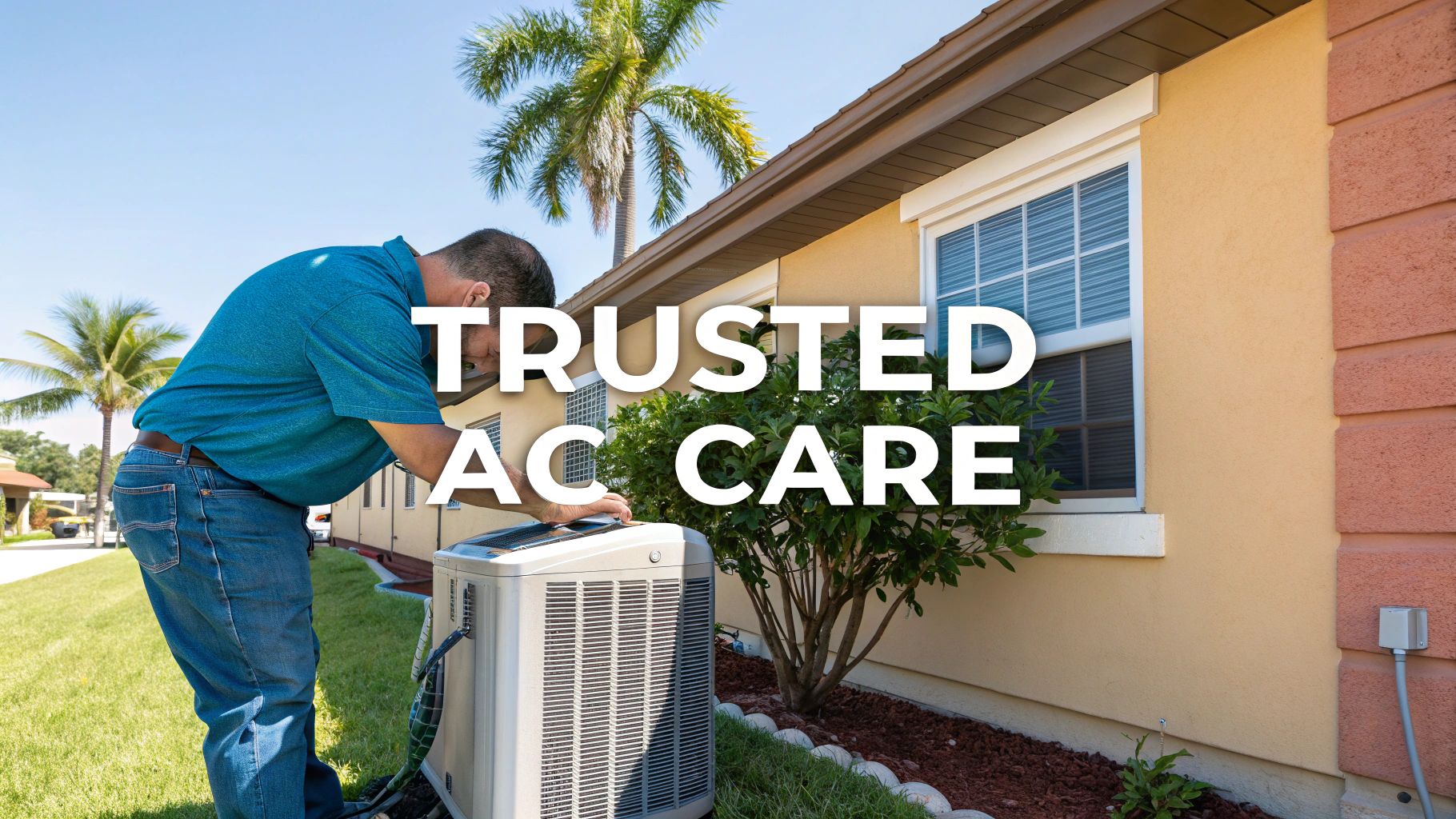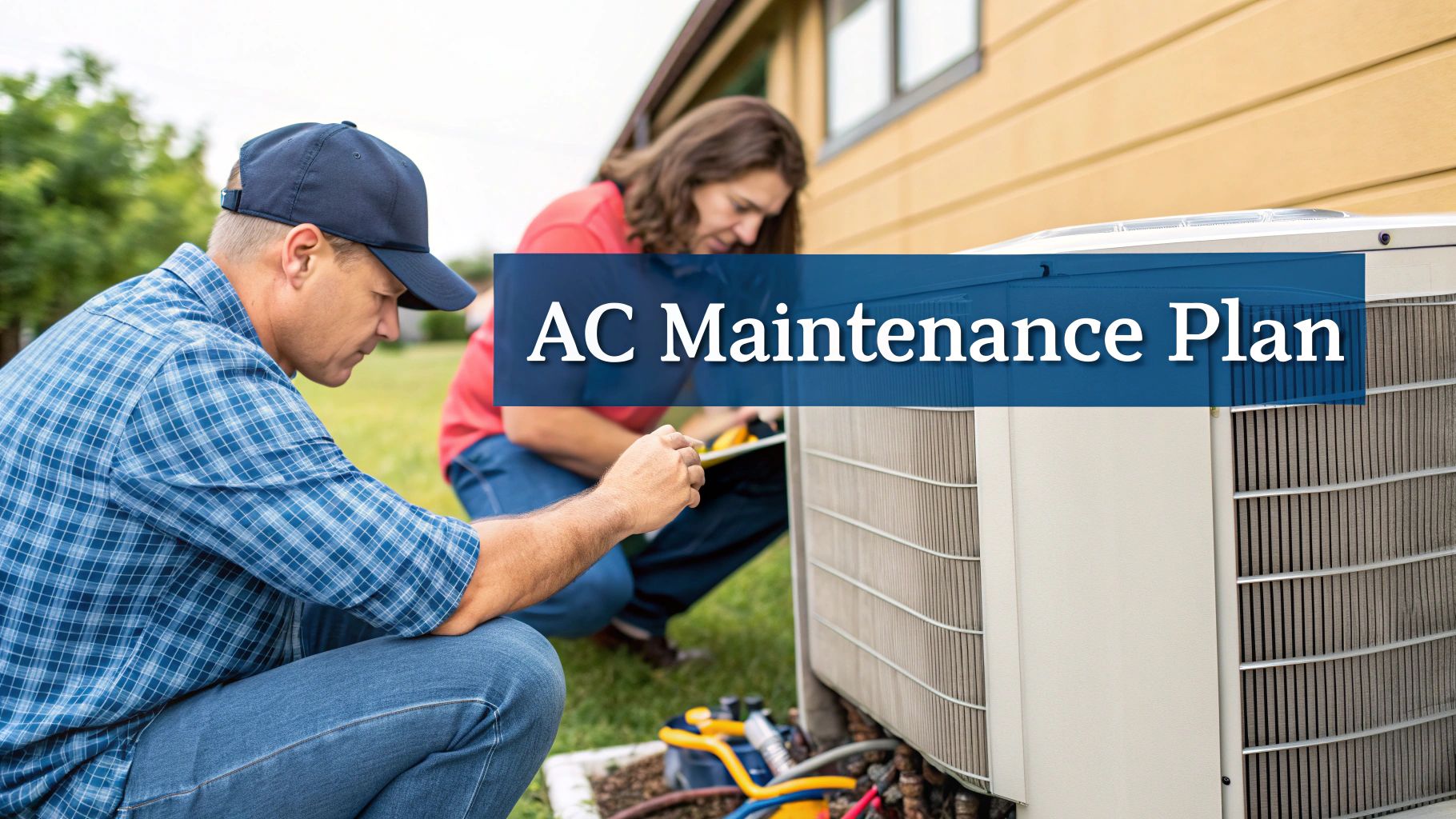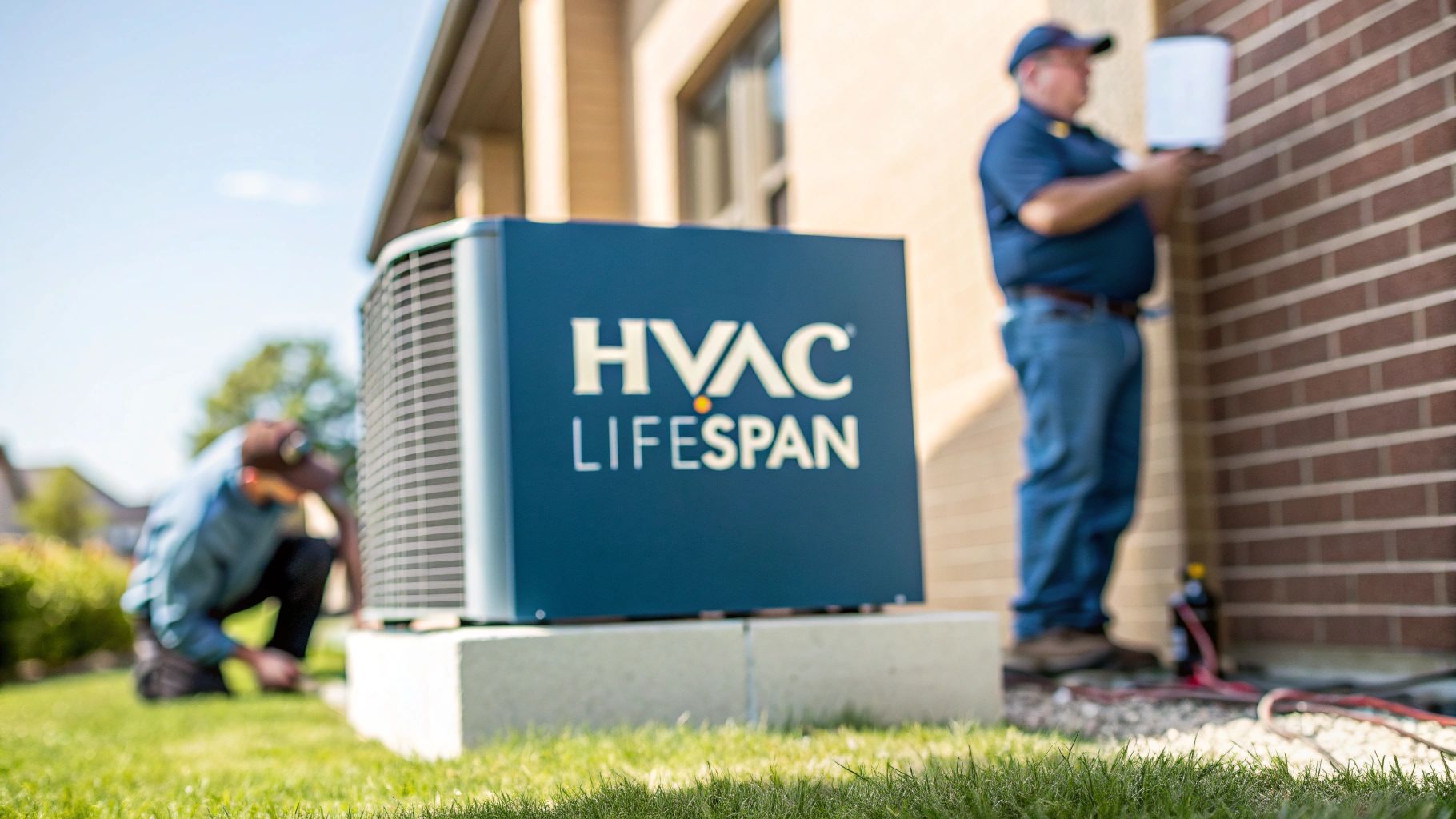Living in Boca Raton, you know that AC maintenance isn't just another item on a to-do list—it's your frontline defense against Florida's famous heat and humidity. Think of it less as a chore and more as a smart investment in your comfort, your wallet, and even your health.
Why AC Maintenance Is Essential in Boca Raton
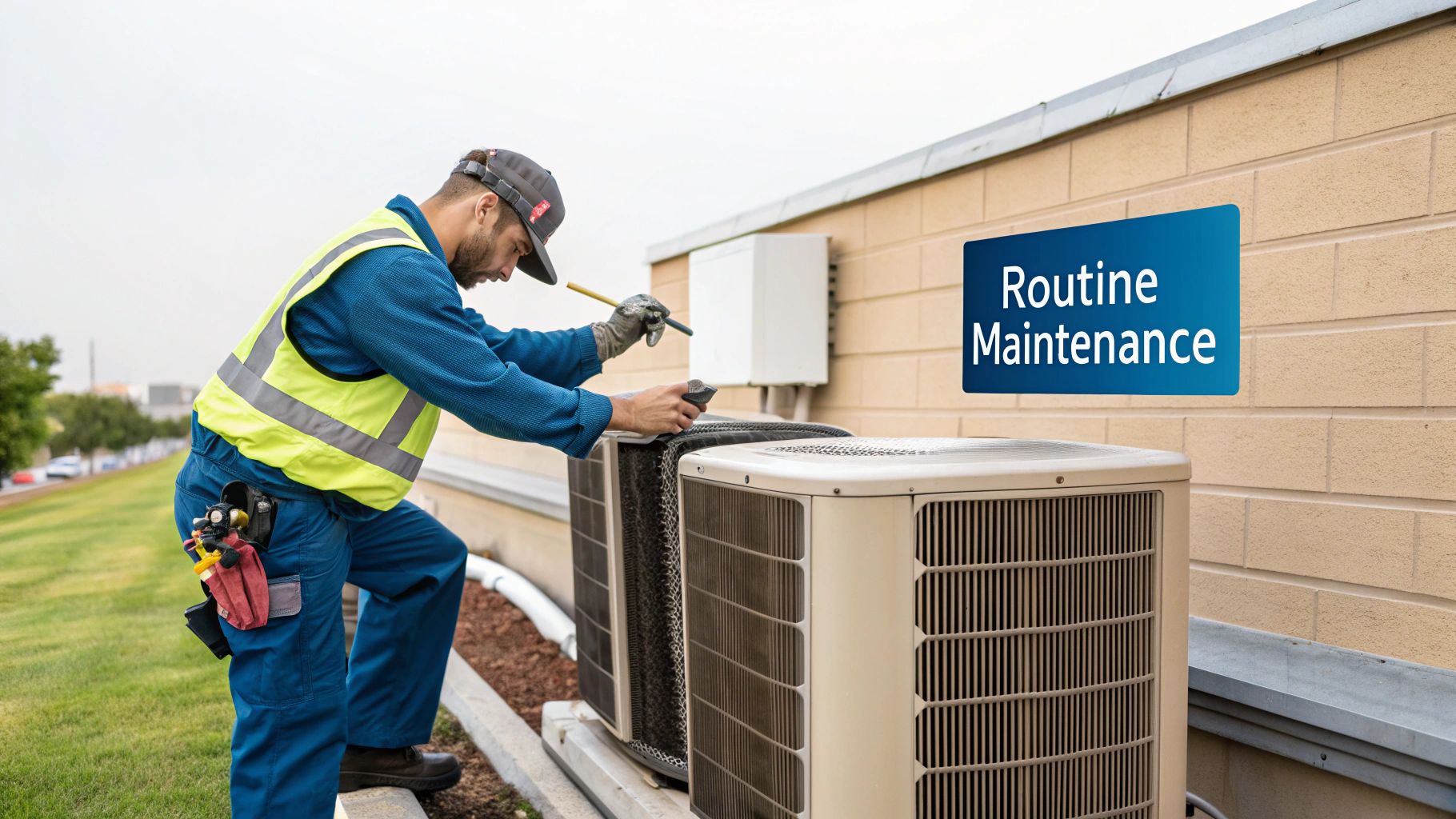
Here in South Florida, our air conditioners aren't just seasonal appliances; they're the workhorses of our homes, running almost constantly. That relentless operation puts a massive amount of strain on the system, causing wear and tear you just don't see in cooler parts of the country.
Ignoring your AC is like asking a marathon runner to compete every single day without any rest or support. Sooner or later, a breakdown isn't just possible—it's practically guaranteed. Professional maintenance is the proactive care that keeps your system in fighting shape for those brutal summer days.
Protecting Your Home and Health
Keeping cool is one thing, but regular AC service is also crucial for protecting the air you breathe. Florida's humidity is the perfect recipe for mold and mildew growth, and the dark, damp coils and drain pans inside your AC unit are prime real estate for it.
During a tune-up, a technician cleans and sanitizes these critical components, stopping harmful spores from being blown all over your house. This is a game-changer for anyone with allergies or respiratory issues. A clean system simply means healthier air for you and your family.
By scheduling regular ac maintenance boca raton residents can dramatically improve their indoor air quality, cutting down on the risk of mold-related health problems and creating a safer home environment.
The Financial Case for Proactive Care
It’s easy to see maintenance as just another bill, but trust me, it’s one of the best financial moves a homeowner can make. A clean, well-tuned air conditioner runs circles around a neglected one when it comes to efficiency. When a tech cleans the coils, tightens connections, and checks refrigerant levels, your unit doesn't have to work as hard to cool your home.
That improved efficiency means lower FPL bills month after month. But the real savings come from avoiding the two scariest costs of AC ownership:
- Emergency Repairs: Let's be honest, your AC never breaks down on a pleasant day in February. It always waits for the peak of a July heatwave, when HVAC companies are swamped and emergency service fees are sky-high.
- Premature Replacement: A typical AC system should last 10-15 years, but constant, heavy use without proper care can slash that lifespan. Regular service is what extends the life of your unit, pushing that huge replacement cost years down the road.
When you look at it that way, the small cost of a yearly tune-up is nothing compared to the thousands you could spend on a catastrophic failure or a brand-new system. It's simple preventative care that protects both your comfort and your bank account.
What a Professional AC Tune-Up Actually Includes
Ever wonder what really happens when a technician comes out for AC maintenance in Boca Raton? It’s far more than a quick glance and a thumbs-up. A proper tune-up is a deep dive into your system's health, designed to catch problems early and keep everything running efficiently.
Think of it like a detailed physical for your home's hardest-working appliance. Your AC has two basic jobs: pull heat out of your indoor air and dump that heat outside. Every single step in a tune-up is about making those two processes happen as smoothly and cheaply as possible.
This visual breakdown shows the real-world perks you get from consistent, professional AC service.
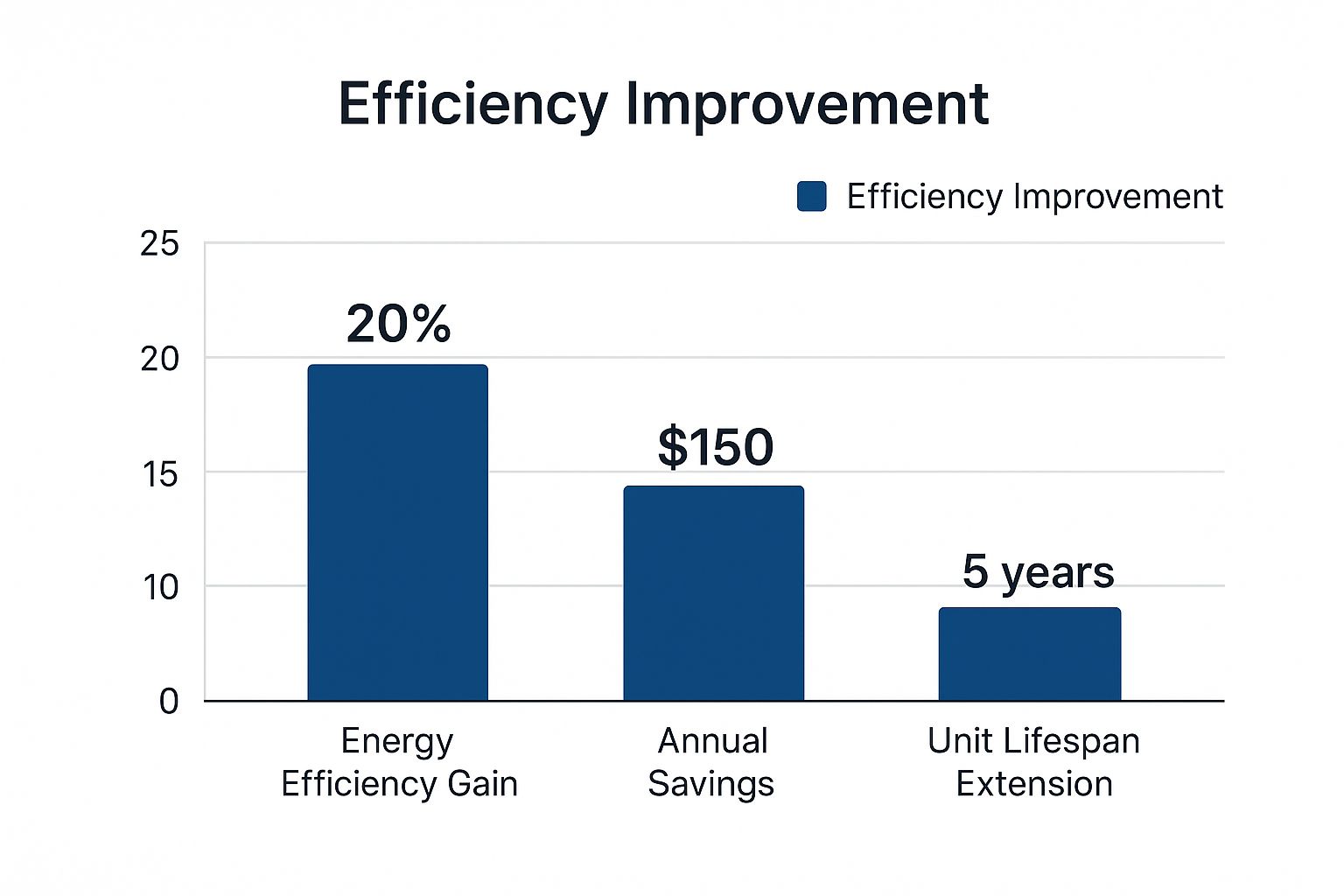
As you can see, it's not just about comfort. The benefits add up to real long-term value, from lower energy bills and fewer repair calls to getting more years out of your equipment.
The Indoor Unit Inspection
The whole process usually starts inside at your air handler—the part of the system responsible for absorbing heat. Keeping this component in top shape is critical for cooling power and for the quality of the air you breathe.
A technician’s first stop is the evaporator coil. This is where the magic of cooling happens, but it’s also a magnet for dust and grime. Over time, that buildup acts like an insulating blanket, forcing your AC to work way harder. A thorough cleaning brings it back to peak performance.
Next up is the condensate drain line. In our humid climate, your AC pulls gallons of moisture out of the air every day. That water has to go somewhere, and if the drain line gets clogged with gunk, it can back up and cause a watery, expensive mess inside your home. Flushing this line is a simple step that prevents a major headache.
The Outdoor Unit Service
With the indoor unit checked out, the tech heads outside to the condenser. This unit's only job is to release all that collected heat into the open air, so its ability to "breathe" is non-negotiable.
Here are a few key tasks for the outdoor unit:
- Cleaning the Condenser Coils: The fins on the outdoor unit get blasted with dirt, pollen, and leaves. A careful cleaning ensures it can transfer heat effectively.
- Checking the Fan Motor and Blades: A tech will inspect the fan for damage and lubricate its motor to keep it spinning quietly and freely.
- Leveling the Unit: If the condenser pad has settled and is no longer level, it puts extra strain on the compressor. They'll make sure it's sitting flat and stable.
This is also where a lot of the electrical work happens. A technician will tighten connections, test capacitors, and inspect relays. Faulty or loose wiring is a common cause of system failure and, in worst-case scenarios, a fire risk.
System-Wide Checks and Calibrations
After looking at the individual parts, it's time to see how they work together as a complete system. This is where the fine-tuning happens.
One of the most crucial checks is the refrigerant level. If it's too low, your system won't cool well. If it's too high, you risk damaging the compressor—the most expensive part of your AC. A pro will measure the pressure precisely to ensure it matches the manufacturer’s specs and check for any hidden leaks.
A comprehensive tune-up involves a detailed checklist of inspection points. The table below outlines what you can expect a qualified technician to cover.
Professional AC Tune-Up Checklist What to Expect
| Component Check | Purpose of the Check | Benefit for Homeowner |
|---|---|---|
| Thermostat Calibration | Ensures the thermostat accurately reads the room temperature and signals the AC. | Prevents the system from running too long or too little, saving energy. |
| Evaporator & Condenser Coils | Cleans away dirt and debris that block airflow and heat transfer. | Boosts cooling efficiency and lowers monthly utility bills. |
| Refrigerant Levels | Verifies the system has the correct amount of refrigerant to operate safely. | Protects the compressor from damage and ensures powerful cooling performance. |
| Condensate Drain Line | Flushes the line to prevent clogs from algae and sludge buildup. | Prevents water backups that can cause significant property damage. |
| Electrical Connections | Tightens all wiring and tests capacitors, relays, and contactors for wear. | Reduces the risk of sudden system failure and potential electrical hazards. |
| Blower & Fan Motors | Inspects components and lubricates moving parts to reduce friction. | Ensures quiet operation and extends the lifespan of critical motors. |
| Overall System Test | Runs the AC through a full cycle to confirm all parts are working in harmony. | Provides peace of mind that the system is reliable and ready for summer heat. |
This meticulous process ensures every part of your system is primed and ready for the demanding Boca Raton summer.
Finally, the technician will calibrate your thermostat to make sure it’s reading the temperature correctly and telling the AC what to do at the right time. For an even closer look at all the steps involved, you can review a detailed HVAC preventive maintenance checklist. This level of detail is what separates a quick check-up from a truly valuable service.
The Ideal AC Service Schedule for Florida Homes
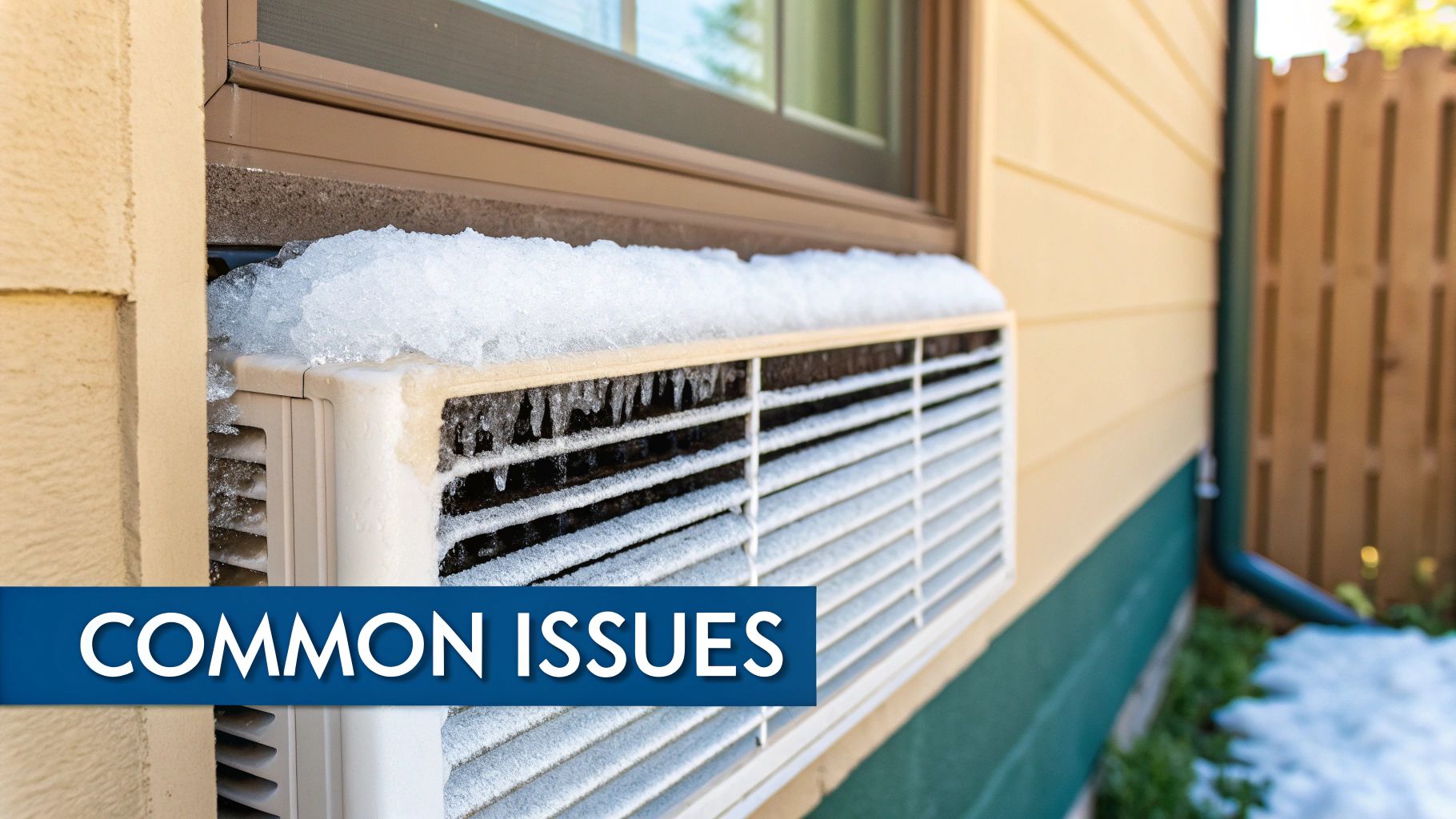
One of the first questions I always get from homeowners is, "So, how often do I really need to get my AC serviced?" It's a great question. While you might hear that once a year is fine, that advice just doesn't hold up in a place like Boca Raton.
Down here in South Florida, our air conditioners are true workhorses. They aren't just cooling the air; they're in a constant battle with oppressive humidity, which puts an incredible amount of stress on the entire system. A single annual check-up is like sending a soldier into battle with half their gear—it's just not enough to handle that kind of strain.
That's why the gold standard for AC maintenance in Boca Raton is a bi-annual schedule. We're talking two professional visits a year, timed perfectly to get your system ready for the brutal summer and help it recover afterward.
The Bi-Annual Maintenance Strategy
I like to think of this schedule like training for a marathon. You wouldn't run a 26-mile race without a pre-race check-up, and you certainly wouldn't skip the recovery phase afterward. Your AC needs that same level of care to perform at its peak when it matters most.
This approach breaks down into two crucial tune-ups:
- The Pre-Summer Tune-Up (Spring): This one is all about preparation. A technician comes out to clean, calibrate, and give your whole system a thorough inspection. The goal is to make sure it's 100% ready to handle the summer heat without breaking a sweat.
- The Post-Summer Check (Fall): After running nearly nonstop for months, your AC has taken a beating. This service focuses on cleaning out all the summer grime, looking for parts that are showing wear, and making sure the system is in good shape as we head into the milder months.
This two-visit strategy is hands-down the best way to prevent those awful mid-summer breakdowns, keep your energy bills in check, and add years to your equipment's life. It's preventative care designed specifically for our climate.
When You Might Need Service More Often
While twice a year is a solid baseline for most homes, some situations put even more stress on an HVAC system. If any of the following sound familiar, you might want to consider more frequent check-ins or at least more frequent filter changes.
A proactive maintenance schedule doesn't just prevent repairs; it ensures your system runs at peak efficiency, which can lower your FPL bill by 5% to 15% annually. The service often ends up paying for itself.
Think about a more tailored service plan if your home has:
- Pets That Shed: We love our furry friends, but their hair and dander are notorious for clogging air filters and coating coils. This chokes off airflow and forces your system to struggle.
- Family Members with Allergies: More frequent service, especially filter changes and coil cleanings, is a game-changer for indoor air quality. It helps pull dust, pollen, and other irritants out of the air you breathe.
- Proximity to Saltwater: Living the coastal dream in Boca Raton means dealing with salt in the air. That salty mist can speed up corrosion on your outdoor unit, but regular cleanings help fight it off.
- An Older AC System: Just like anything else, units over 10 years old are more likely to have issues. More frequent inspections can catch a failing part before it causes a total system failure on a 95-degree day.
Simple DIY Steps Between Professional Tune-Ups
https://www.youtube.com/embed/k7PSzi7NSyc
While nothing replaces a professional tune-up, you absolutely have a role to play in your AC’s health. Think of it this way: your technician is the doctor who performs the annual check-up, but you're in charge of its daily well-being. A few simple habits between those professional visits can make a world of difference.
These are easy, homeowner-friendly tasks that don't require fancy tools or technical know-how. But don't let their simplicity fool you. They are incredibly powerful, helping your system breathe easier, reducing strain on its most important parts, and keeping your indoor air cleaner. You’re not just maintaining your AC—you’re stopping problems before they even start.
Master the Air Filter Change
If you do only one thing for your AC, make it this: change the air filter regularly. Seriously. A dirty filter forces your system to work way harder than it should, almost like making it breathe through a clogged straw. This chokes off airflow, drives up your energy bill, and puts a ton of stress on the fan motor.
Beyond efficiency, a clogged filter just can’t do its job of trapping dust, pollen, and pet dander. All that gunk gets pulled deeper into your system, coating sensitive components and getting blown right back into the air you breathe.
Here’s a good rule of thumb for how often to change it:
- Homes with no pets: Every 90 days.
- Homes with one pet: Every 60 days.
- Homes with multiple pets or allergy sufferers: Check it every 30-45 days.
Just be sure to know your filter’s size (it’s printed right on the frame) and which way the arrow points. That arrow needs to face the furnace or air handler, showing the direction of the airflow.
Keep the Outdoor Condenser Clear
Your outdoor unit—the condenser—has a critical job: releasing all the heat it pulled out of your house. To do that efficiently, it needs room to breathe. When landscaping, leaves, or even grass clippings block the fins, heat gets trapped inside. This forces the compressor, the heart of your system, to work overtime.
Make it a habit to walk around your condenser once a month.
- Create a Clear Zone: Trim back any bushes, weeds, or branches so there’s at least two feet of clear space on all sides.
- Remove Debris: Gently clear away any leaves, grass, or dirt stuck to the fins. You can use a garden hose on a light setting to rinse away grime. Just be sure to spray from the inside out so you don't push debris deeper into the unit.
Safety First: Before you do any cleaning, shut off the power to your outdoor unit. Do it at both the main circuit breaker and the exterior shut-off box. It’s a simple but non-negotiable step to prevent any risk of electrical shock.
Check the Condensate Drain Line
Living in Boca Raton means dealing with serious humidity, and your AC removes gallons of it from the air. That water travels outside through a PVC pipe called the condensate drain line. Over time, that damp, dark pipe can become a breeding ground for algae and sludge, leading to a clog.
If that line gets blocked, the water has nowhere to go but back into your home, which can cause some serious water damage. A quick way to check is to find where the pipe exits your house and see if water is dripping when the AC is running. If it looks blocked, don't worry—a technician can easily and safely flush it out during your next ac maintenance Boca Raton service call.
Know Your Limits: DIY vs. Professional Tasks
While these DIY steps are fantastic for your system's health, it’s crucial to know where to draw the line. Certain jobs are best left to the pros who have the right tools, training, and safety equipment.
The table below breaks down what you can tackle yourself versus what absolutely requires a certified technician.
DIY Maintenance vs Professional Service Tasks
| Maintenance Task | Safe for DIY? | Requires a Professional? |
|---|---|---|
| Changing the air filter | Yes | No |
| Clearing debris from the outdoor unit | Yes | No |
| Checking the thermostat settings | Yes | No |
| Checking for a dripping drain line | Yes | No |
| Flushing the condensate drain line | No | Yes |
| Cleaning the indoor evaporator coil | No | Yes |
| Checking refrigerant levels (Freon) | No | Yes |
| Inspecting electrical components | No | Yes |
| Cleaning the blower motor and fan | No | Yes |
| Measuring system performance/amperage | No | Yes |
Anything involving electrical wiring, refrigerant, or taking apart major components should always be handled by a licensed professional. For instance, cleaning the delicate internal coils is a complex job that requires specialized techniques. You can learn more about how to clean air conditioning coils safely to understand why it's a task best reserved for an expert.
Understanding AC Maintenance Costs in Boca Raton
Let's get right to it: the bottom line. When homeowners in Boca Raton think about professional AC maintenance, the first question is almost always, "How much is this going to set me back?" It's a perfectly valid question, but the answer isn't just a single number. Think of it less as a cost and more as a smart investment in your home's future.
Here’s an analogy I use all the time: you wouldn’t skip a $50 oil change for your car and risk a $5,000 engine replacement, right? AC maintenance is the exact same idea. That small, predictable tune-up fee is your best defense against a catastrophic failure that could cost you thousands.
One-Time Service Call vs. Annual Maintenance Plans
You generally have two ways to approach this. A one-time service call is exactly what it sounds like—you pay a flat rate for a single, thorough tune-up. This is a good choice if you're trying out a new company or haven't had your system looked at in a while.
The smarter play for most homeowners here in Boca, though, is an annual maintenance plan. You pay one yearly fee, which usually gets you two visits (one for cooling in the spring, one for heating in the fall) and a handful of other great perks.
A maintenance plan isn't just about convenience; it almost always saves you money compared to paying for two separate service calls. Plus, members often get priority scheduling and discounts on any repairs that might pop up during an inspection.
Factors That Influence Your Final Price
The cost of a tune-up isn't set in stone. A few key things can affect the final price, which is why it's so important to get a clear, detailed quote before any work begins.
- System Size and Age: It just makes sense—a bigger, more powerful AC system takes more time and effort to service than a smaller one. Older units also need a more careful look, as their parts have a lot more wear and tear.
- Minor Repairs Needed: Sometimes during an inspection, we'll spot a small problem like a weak capacitor or a loose connection. Fixing it on the spot will add a little to the bill, but it's a tiny price to pay to avoid a full-blown system breakdown in the middle of July.
- Refrigerant Regulations: The HVAC world is changing. By 2025, the government is phasing out older refrigerants like R-410A for newer, more environmentally friendly options. This shift can impact the cost of service, especially if your system needs a refrigerant top-off.
The cost of a tune-up is a tiny fraction of what an emergency repair bill looks like. For a closer look at what goes into service pricing, our guide on air conditioning repair costs breaks it all down. At the end of the day, preventative care buys you so much more than just a cool home—it buys you peace of mind.
How to Choose a Trusted AC Company in Boca Raton
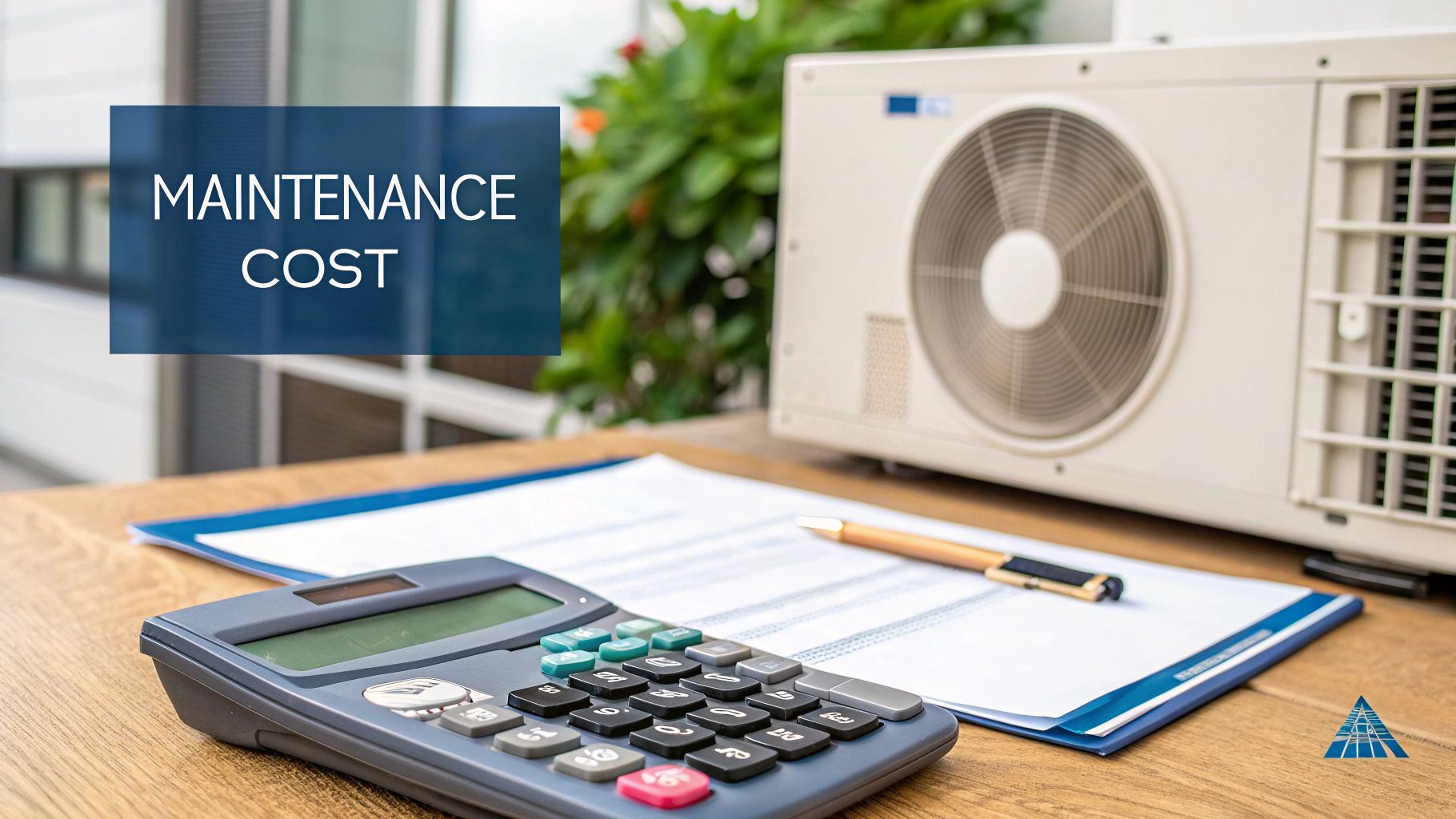
Finding the right crew to take care of your home's air conditioner can feel overwhelming. There are dozens of companies out there, all promising the same thing. So, how do you cut through the noise and find a professional you can actually trust? It comes down to looking past the slick marketing and focusing on what really matters: credentials, customer focus, and proven expertise.
Choosing a company for AC maintenance in Boca Raton isn't just about finding the cheapest price. You're handing over the keys to a complex, expensive, and absolutely essential piece of equipment. You want someone who knows it inside and out, communicates clearly, and is transparent about their pricing from the get-go.
Verify Licensing and Insurance
Before you do anything else, check for proper licensing and insurance. This is the absolute bare minimum and it’s non-negotiable. A valid Florida license means the company has met the state's strict standards for safety and technical knowledge.
Insurance is just as critical. It protects you and your home from any liability if an accident happens on your property during the service call. Any reputable company will be upfront and happy to show you proof of both.
A top-tier AC company also knows that great service starts with great communication. Many use a dedicated HVAC answering service to make sure you always get a prompt, professional response when you call.
Look for NATE Certification
Licensing is the floor, but NATE-certification is the ceiling. NATE (North American Technician Excellence) is a voluntary certification that techs earn by passing tough, real-world exams. It's truly the gold standard in our industry.
When you see that a technician is NATE-certified, it’s an extra layer of confidence. It tells you they have proven, hands-on knowledge of modern HVAC systems and aren't just learning the ropes on your time—and your dime.
Ask the Right Questions
Once you have a shortlist, it's time to make some calls. The way a company handles your questions speaks volumes about how they'll handle your AC system.
Get a feel for their professionalism by asking a few key questions:
- Can I get a detailed, written estimate? Never settle for a verbal quote. A written breakdown of all costs protects you from surprise fees down the road.
- How do you handle after-hours emergencies? Air conditioners love to fail at the worst possible times. Find out their emergency availability and what the fees look like.
- Are you familiar with my specific AC brand? Most good techs can handle any make or model, but someone with direct experience with your unit’s manufacturer might spot issues faster.
- What's included in your maintenance plans? If you're thinking about a service agreement, get a clear rundown of the perks, like priority service or discounts on future repairs.
It's worth noting that the HVAC industry is currently facing a massive technician shortage, with an estimated 110,000 open jobs across the country. In a booming area like Boca Raton, this can mean longer wait times for service. This makes finding a responsive, reliable company more important than ever.
Got Questions About AC Maintenance? We’ve Got Answers.
After digging into the details of keeping your system in top shape, you probably have a few specific questions floating around. Let's tackle some of the most common ones we hear from homeowners right here in Boca Raton, so you can feel confident about keeping your home cool.
Is a Maintenance Plan Really Worth It in Florida?
Oh, absolutely. Here in South Florida, where our ACs work overtime nearly all year, a maintenance plan isn't just a nice-to-have—it's one of the smartest moves you can make for your home. Think of it less as an expense and more as an investment.
A good plan usually covers two professional tune-ups a year (spring and fall), which is exactly what a system needs to handle our climate. This catches the small stuff before it snowballs into a costly emergency call. Plus, most companies give plan members perks like priority service and discounts on parts, so the plan often pays for itself pretty quickly.
What Warning Signs Mean My AC Needs Immediate Attention?
Your air conditioner is pretty good about telling you when something's wrong—you just have to know what to listen for. Catching these signals early can save you from a complete, sweaty breakdown.
Keep an eye (and an ear) out for these red flags:
- Strange Noises: Banging, rattling, or screeching are definite cries for help. It usually means a part is loose or a motor is on its last legs.
- Weak Airflow: If the air trickling out of your vents feels weak or isn't as cold as it used to be, you might have a simple clogged filter or a more serious issue with the compressor.
- Funky Smells: A musty odor often points to mold hiding in your unit. If you smell something burning, that's a serious red flag for an electrical problem.
- Sudden Spikes in Your FPL Bill: When your energy bill shoots up out of nowhere, it's often because your AC is struggling to keep up due to an internal fault.
If any of these pop up, don't just hope they go away. It’s time to call a pro and get it checked out.
How Much Can Regular Service Lower My Energy Bill?
This is a great question, and the answer is—a lot. A clean, well-maintained AC system doesn't have to fight to cool your home. When the coils are clean and all the levels are where they should be, the unit just runs better and uses less power.
On average, consistent professional maintenance can cut your AC's energy use by 5% to 15%. That means your investment in an ac maintenance Boca Raton plan shows up as real savings on your utility bills, month after month.
What Is the Lifespan of an AC in Boca Raton?
Down here, the heat and salty, humid air are tough on machines. An air conditioner in South Florida has a much harder job than one in a cooler, drier part of the country, which means they tend to wear out faster. An AC that's left to fend for itself might only give you 8 to 10 years.
But with regular, twice-a-year maintenance, you can add years to its life. A system that gets the care it needs can easily run strong for 12 to 15 years, or even longer. That’s a huge difference when you think about the cost of a full replacement.
Ready to protect your investment and keep your home comfortable all year? The certified pros at Florida Cooling Group are here to help with expert maintenance, repairs, and installations. Schedule your AC service today!
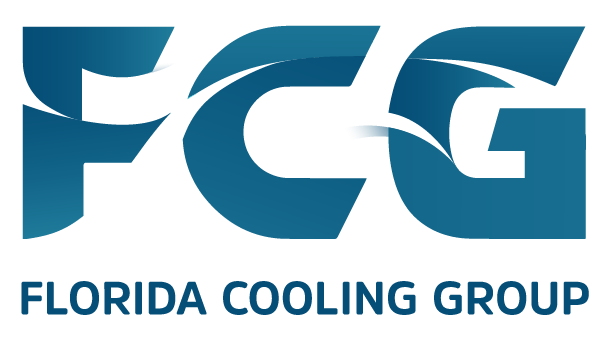
 (561) 400-2205
(561) 400-2205